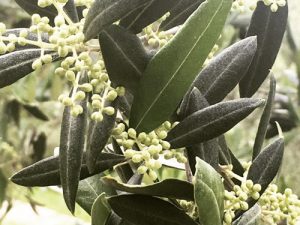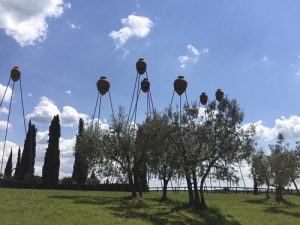The Cooperative Frantoio del Grevepesa, located in in the area of Chianti, on the hills within the Province of Florence, was created in order to procure olives from Chianti’s farmers in order to produce high quality olive oil. The cooper- ative produces certified oil with different labels (organic oil, Protected origin oil, oil of area Chianti). In total, 250 farmers are members of the co-operative.
The cooperative is born in 1975, promoted by 100 farmers from the Provinces of Firenze, Siena and Arezzo. Currently the number farmers involved has grown to 250. The cooperative collects olives from the associated farmers and pro- duces 5 types of extra-virgin olive oil. The reason which led to set up the cooperative being established was the need of farmers to develop a common mill collecting olives from little farms and transform the olives in oil. The mission of the cooperative is to produce olive oil of high quality, and to promote and market the product and create added value for associated farmers. The Cooperative owns an oil mill which is a modern plant based on a continuous cycle in two phases, without the addition of water. The production capacity is 400.000 liters of olives oil. The co-operative currently employs 3 people with an average yearly turnover of € 850.000. Some farmers have a contract with the cooperative for the production of the oil and the cooperative also sell the oil and pass on the market price to the farmers; other farmers prefer that the cooperative only does the milling and bottling and pay the cooperative for this service. They then sell the produce themselves. The cooperative offers two additional services: - The sale of olives kernel, as bio-fuel for heating; - An Eco-centre collecting waste from farmers.
The average yearly production of the cooperative is around 400 Tons of olive oil. The cooperative is managed from a board of 8 farmers, that submit the main decisions to the general shareholders’ meeting.
The main threat to the olive oil sector in Tuscany is farmers leaving the sector due to low productivity. In Tuscany there are 90.000 hectares of olive plants, with a yearly production of 18.000 Tons of oil (0,2 tons per Hectare). The low productivity levels are being caused by:
- Olives cultivation currently occurrs on the hills; therefore in most part of Tuscany is not possible to realize an intensive cultivation of olives tree (compared to other areas of Italy).
- The farms are small and cannot adopt a intensive mechanization of cultivation processes. For this reason the production costs are very high.
- The geographical position of Tuscany (the production of olives oil is typical in the south regions, while Tuscany is at the northern limit of the area of olives cultivation) does not allow for high production, compared with other areas producing olives oil.
- The transformation process from olives to oil require an industrial plant not economically sustainable for small farmers.
On the other hand, the quality of olives oil of Tuscany is globally recognized. Therefore, farmers of this sector are fac- ing intense competition from other oil producers. The development of a regional cooperative which collects olives from associated farmers, and produces and sells the olive oil is very important. The special challenge of Frantoio del Grevepesa is to produce only certified oil of high quality, using local olives produced in the provinces of Florence, Siena and Arezzo. The Cooperative must maintain high quality standards despite the specific challenges posed by biological factors, climatic trend, diseases.
In summary, the main challenges addressed by this cooperative include:
- Increase competitiveness within the olive oil sector.
- Expanded market share at local, national and international scales through focusing on quality oil production.
- Ensure a good income to the associated farmers.
The main learning element which emerged from this experience of cooperation, concerns the possibility for small farmers, thanks to their involvement in the cooperative, to establish market presence and sustainable income levels , due to following factors:
- Possibility to concentrate the product offered in the market.
- Better opportunity to manage a commercial/customer relationships.
- Possibility to manage, as cooperative, the costs of certification processes to prove the oil is from the region and organic.
In order to establish this form of co-operative, it is essential to know:
- Cooperation system in agriculture, in terms of advantages/critical points of different aggregation forms;
- Management: relationship with associated farmers, marketing, legal rules relevant to cooperatives and its struc- ture, administrative management, accountability;
- Production: specific skills for managing the production process, evaluate the quality of olives and oil.
The main benefit for farmers participating in this cooperation experience is the opportunity to develop a mechanism to valorize their products, transforming olives into a high quality product with a good price in the market.
The critical point is that olive oil market is very inconsistent. The price is influenced by trends on the global market, and sometime is very difficult to recover the production costs.
Advice/Recommendation
According to Filippo Legnaioli, President of Cooperative, the following are key considerations:
"The development of certified quality of production is the only possible strategy to increase the competitiveness of olives oil sector in Tuscany."
"Olives cultivation is an important heritage for landscape and environment; therefore policy makers should make the maximum effort to promote and safeguard this sector."
"Cooperation is essential in the olive oil sector."
Queries/Questions
- What do you think about the different model of olives oil production in Europe?
- Do you think that focusing on quality and organic/sustainable production is a good strategy for cooperatives to consider when promoting their food products?



 Čeština
Čeština  English
English  Français
Français  Deutsch
Deutsch  Italiano
Italiano  Slovenščina
Slovenščina  Español
Español 



